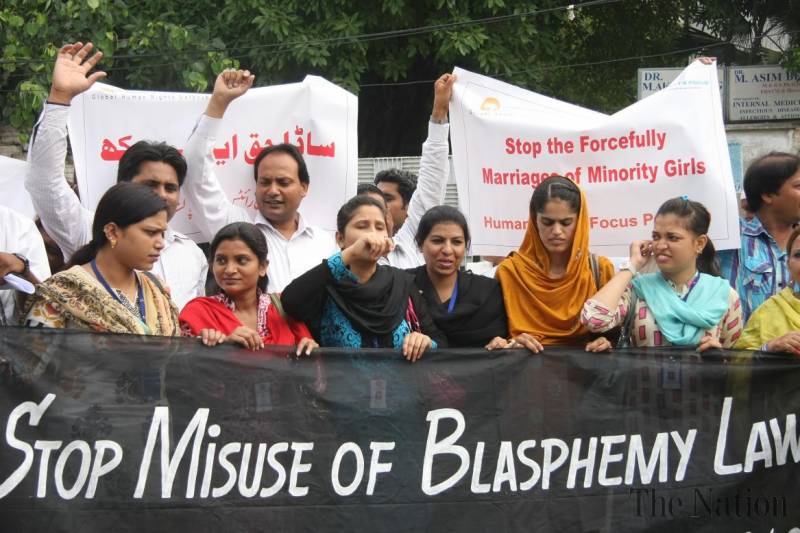Pakistan's Increasing Intolerance: Man Sentenced To Death For 'Blasphemous' Facebook Post
THE CITIZEN BUREAU

NEW DELHI: In a worrying development that comes as Pakistan cracks down on freedom of speech on social media, a 30 year old man was awarded the death sentence for a series of ‘blasphemous’ posts on social media site Facebook.
An anti-terrorism court in Bahawalpur sentenced Taimoor Raza to death last week, pronouncing him guilty of insulting the Prophet Mohammad. Although Pakistan has very stringent anti-blasphemy laws, this is the first time such a stringent punishment has been meted out in connection to views expressed on social media.
Raza -- from the minority Shia community -- was arrested about a year ago after engaging in a debate on Facebook about Islam. It turned out that the person engaging with Raza was an undercover counter-terrorism agent.
Amnesty International's Pakistan campaigner, Nadia Rahman, said in a statement the conviction set a "dangerous precedent. "No one one should be hauled before an anti-terrorism court or any other court solely for peacefully exercising their rights to freedom of expression and freedom of thought, conscience, religion or belief online," Rahman said.
The conviction comes as Pakistan intensifies its crackdown on what it perceives as dissent on social media. In March this year, Pakistan has asked Facebook to look into so-called “blasphemous” content posted by Pakistanis on the social media platform. Pakistan Interior Minister Chaudhry Nisar Ali Khan said at the time "nothing can be greater than our religion to us" in stopping blasphemy on the internet.
Earlier this year, Pakistani Prime Minister Nawaz Sharif reaffirmed his resolve to crackdown on “blasphemous” activities on social media, calling blasphemy an "unpardonable offence". “The blasphemous content on social media is a nefarious conspiracy to hurt the religious sentiments of the entire Muslim ummah,” Sharif said in a statement posted to the PML-N’s official Twitter handle. The National Assembly passed a resolution condemning blasphemous content posted on social media and unanimously agreed to the formation of a committee of parliamentary leaders to monitor such content.
In May, Pakistan Telecommunication Authority sent citizens a text message warning them against sharing blasphemy online. "The uploading and sharing of blasphemous content on the internet is a punishable action under the law. Such content should be reported for legal action," the alert said.
Blasphemy remains a sensitive issue in Pakistan, where the country’s tough anti-blasphemy laws are often invoked. Critics, however, allege that the law is misused to silence and curb dissent, and even attack and punish the country’s minorities. A report by the United States Commission on International Religious Freedom says Pakistan’s use of the blasphemy law is “incomparable” to anywhere else. 14 people are currently on death row in Pakistan and 19 others serving life sentences for charges of blasphemy against Islam.
A Human Rights Watch report states that “abuses are rife under the country’s abusive blasphemy law, which is used against religious minorities, often to settle personal disputes.”
The blasphemy laws, which relate to Section XV Articles 295-298 of the Pakistan Penal Code, are indicative of the growing intolerance and religious radicalisation in Pakistan. Although the Pakistan Penal Code always had a provision to safeguard against blasphemy, it was only in the 1980s that Islam was singled out receiving specific articles. In 1982, under General Zia-ul-Haq’s regime, the death penalty and life imprisonment were added as punishments relating to the law.
The laws themselves are quite expansive. They prohibit expression that is intended to wound “religious feelings,” and deliberate or malicious acts intended to “outrage religious feelings of any class by insulting its religion or religious beliefs;” the laws specifically, through the provisions added in the 1980s, prohibit defiling the Quran and insulting the Prophet Muhammad, his wives, family or companions. The “misuse of epithets, descriptions and titles” is also prohibited. Following the 1982 amendment that introduced the death penalty and life imprisonment, an amendment in 1992 made the death penalty mandatory for individuals convicted of making derogatory remarks about the prophet. Since then, successive governments - both Benazir Bhutto and Pervez Musharraf expressed their commitment to amend the law - have failed to introduce measures to change the law, succumbing to pressures by extremists and clerics.
Critics of the blasphemy law have often been targeted, a famous example being Salman Taseer who was assassinated by his guard after defending Asia Bibi, a Christian woman charged under the blasphemy law. In 2011, Pakistan’s Minority Affairs Minister Shahbaz Bhatti was gunned down after he campaigned for changes to the law - specifically the provision that judges be required to investigate cases of blasphemy before registering cases and a measure for punishment for false accusations. In July 2013, two brothers who were charged with defaming the prophet were shot dead as they stepped out of a courtroom.
The blasphemy laws exist in the social-cultural-political context of targeted attacks on religious minorities. They are representative of a climate that fosters intolerance and impunity, perpetuating grave human rights violations. Ironically, the laws are indicative of the erosion of the rule of law in Pakistan, with government institutions are at the mercy of islamist extremists - as evinced by the murder of Salman Taseer and Shahbaz Bhatti, or the failure of Benazir Bhutto or General Musharraf to amend the law despite publicly declaring their intention to do so. The latest developments centering on the Sharif government's resolve to crackdown in blasphemy is located in the above context.



